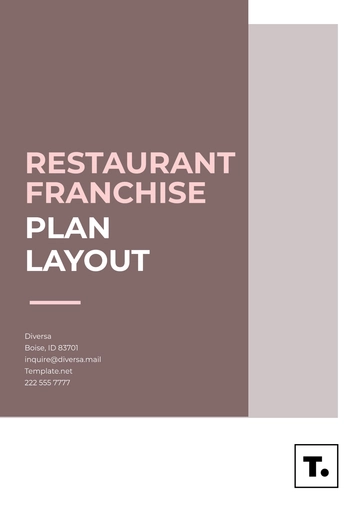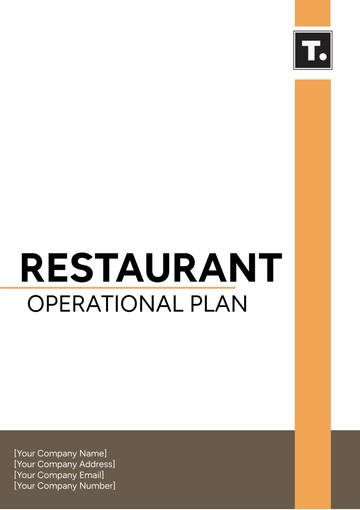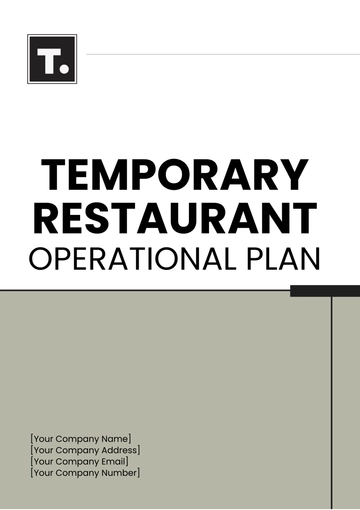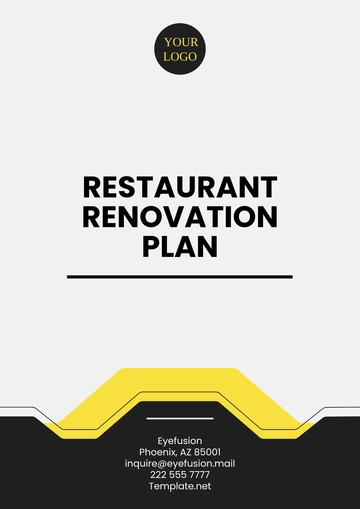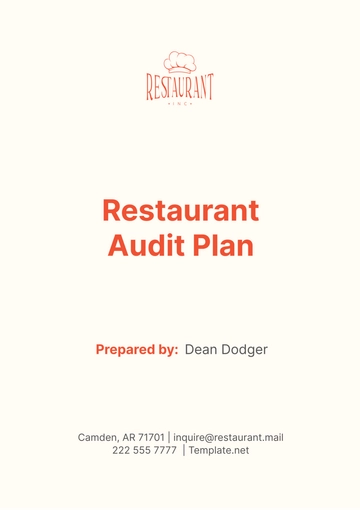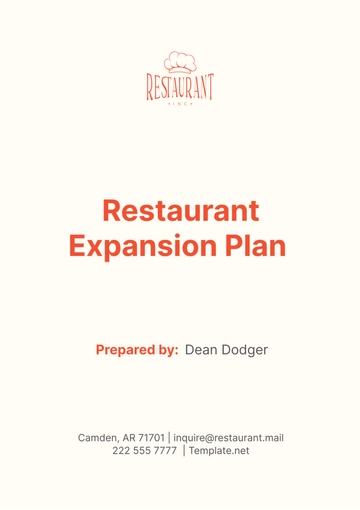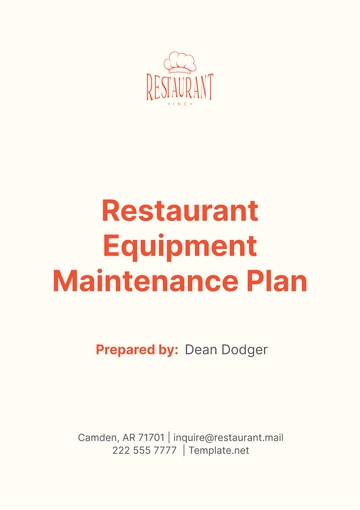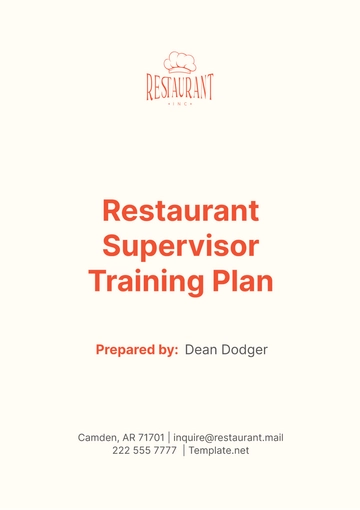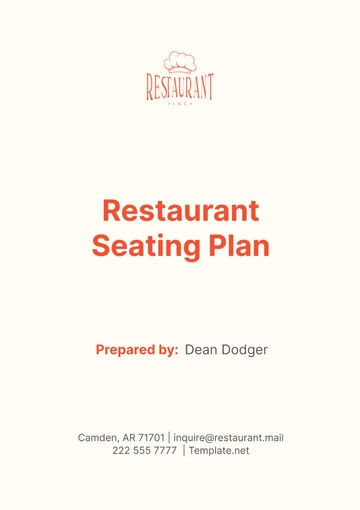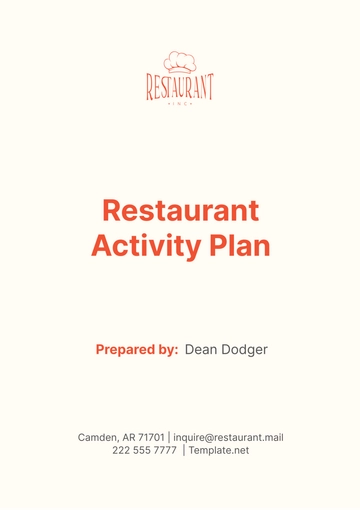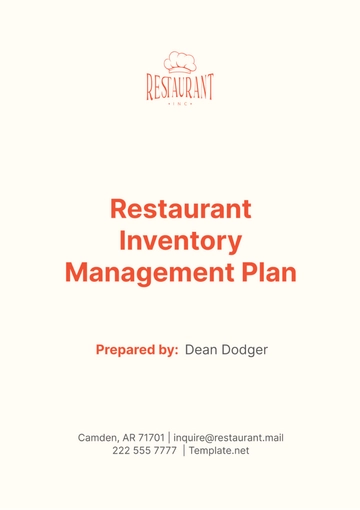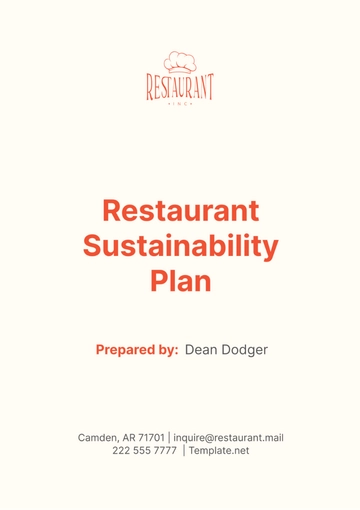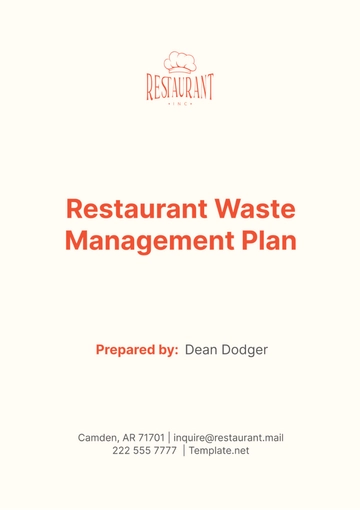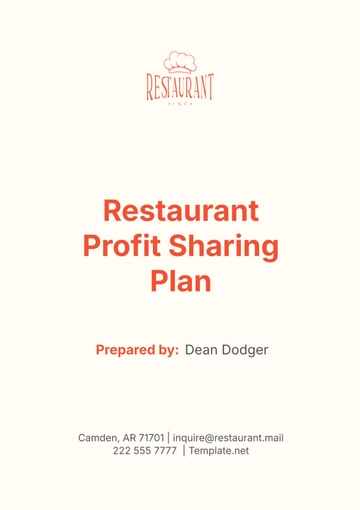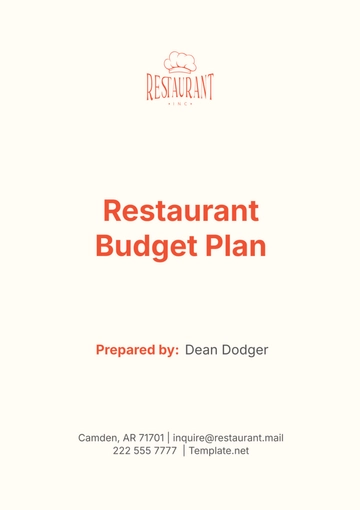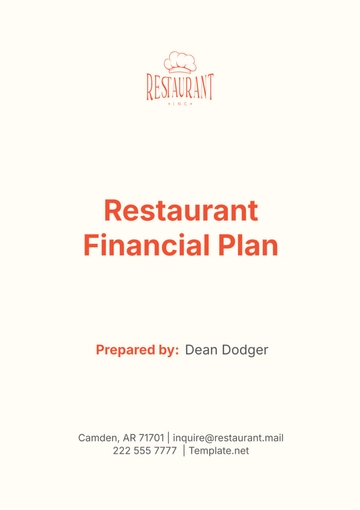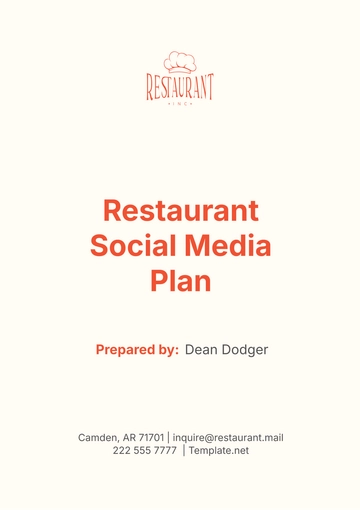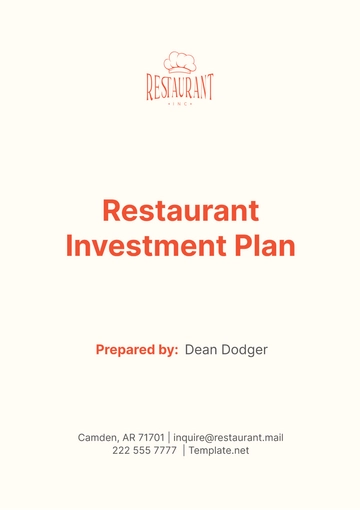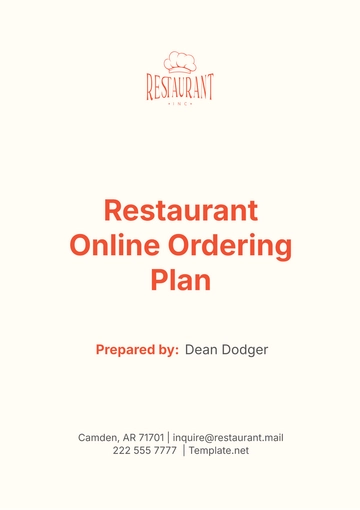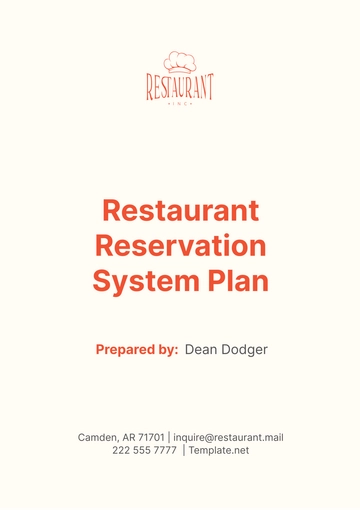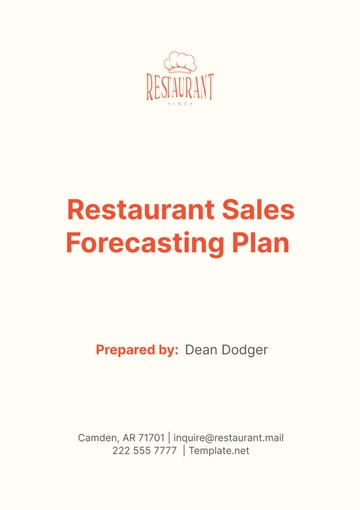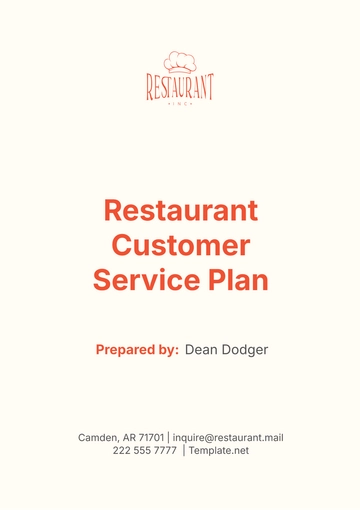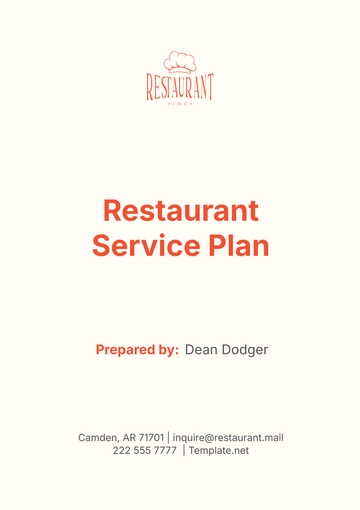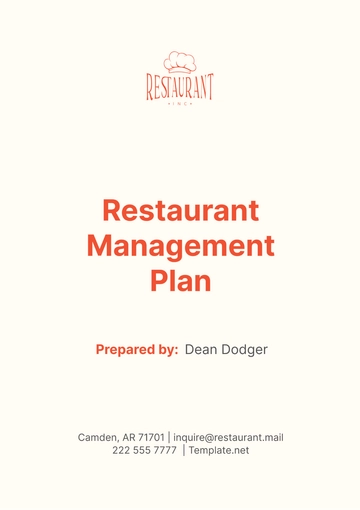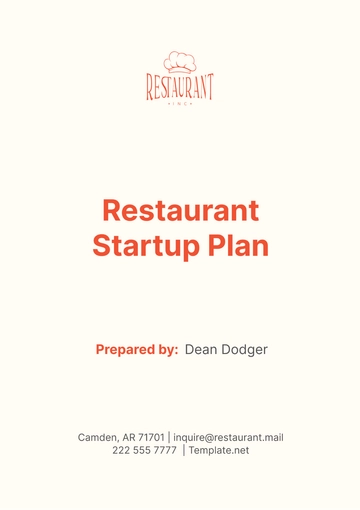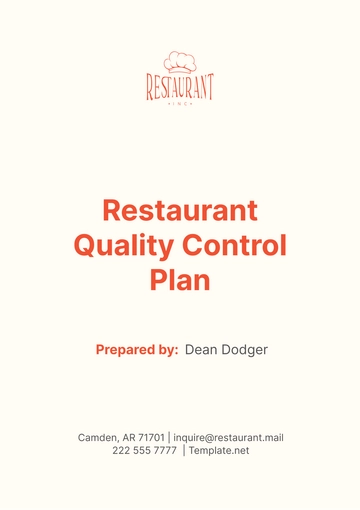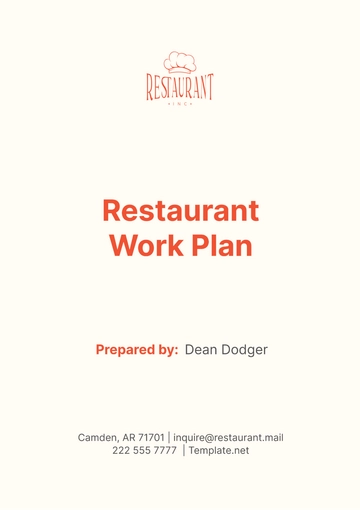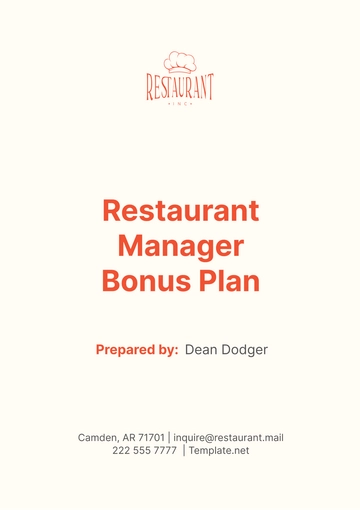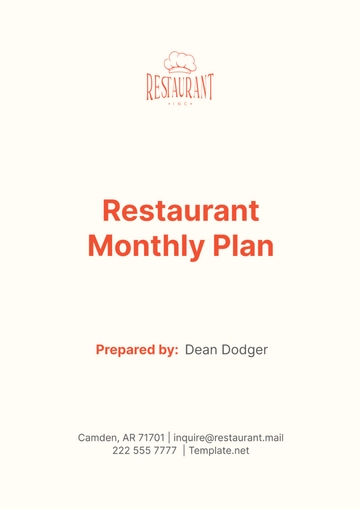Free Restaurant Weekly Plan
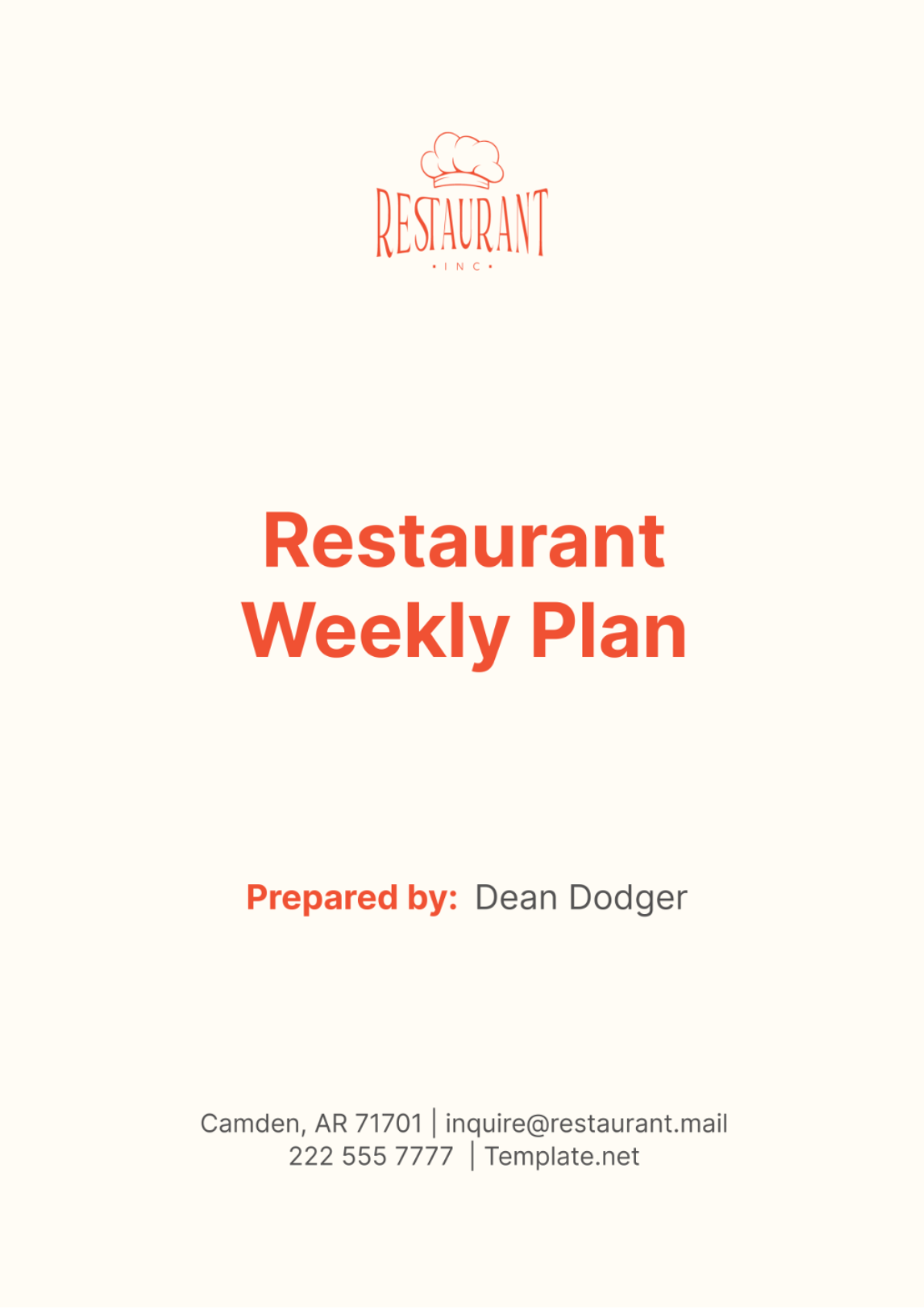
I. Introduction
A. Purpose of the Weekly Plan
The weekly plan serves as a strategic tool to align our team's efforts towards achieving our overarching goals of delivering exceptional dining experiences, optimizing operational efficiency, and maximizing profitability. By outlining specific tasks and priorities for the week, we aim to enhance coordination, minimize disruptions, and consistently meet or exceed customer expectations.
B. Overview of the Current Week's Goals and Objectives
This week, our primary objectives include refining our menu offerings to reflect seasonal ingredients and customer preferences, implementing targeted marketing initiatives to drive foot traffic and increase revenue, optimizing staff scheduling to ensure optimal service levels during peak hours, and closely monitoring financial performance to identify opportunities for cost savings and revenue growth.
II. Menu Planning and Specials
A. Review and Adjust Regular Menu Items
Based on customer feedback, sales trends, and seasonal availability, we will assess the performance of existing menu items and consider potential modifications or replacements to enhance overall appeal and profitability. Our focus will be on maintaining a balance between customer favorites and innovative offerings that showcase our culinary expertise and creativity.
B. Plan Specials for the Week
We will introduce a rotating selection of daily specials, featuring high-quality ingredients sourced from local suppliers and highlighting our chef's signature creations. Additionally, we will leverage market research and customer feedback to design enticing promotions, such as prix fixe menus or themed dining events, to attract new patrons and encourage repeat business.
C. Coordinate with Kitchen Staff
To ensure seamless execution of our menu plans, we will collaborate closely with our culinary team to refine recipes, streamline preparation techniques, and optimize ingredient sourcing. By fostering open communication and fostering a culture of creativity and collaboration, we aim to inspire our kitchen staff to deliver consistently outstanding dishes that exceed guest expectations.
III. Inventory Management
A. Take Stock of Current Inventory Levels
We will conduct comprehensive inventory counts across all product categories, including perishable and non-perishable items, to accurately assess stock levels and identify any discrepancies or shortages. This data will inform our purchasing decisions and help us minimize waste, reduce carrying costs, and maintain optimal inventory turnover ratios.
B. Create Orders for Restocking
Based on our inventory analysis and anticipated demand, we will generate purchase orders to replenish stock for essential ingredients, beverages, and supplies. By leveraging our established relationships with trusted suppliers and negotiating favorable pricing terms, we aim to secure competitive pricing and ensure timely delivery of high-quality products that meet our exact specifications.
C. Coordinate Deliveries
We will liaise with our suppliers to coordinate delivery schedules and logistics, ensuring that all incoming shipments are received promptly, accurately, and in compliance with our quality standards. Our team will carefully inspect incoming inventory for freshness, quality, and proper labeling, and promptly address any issues or discrepancies to prevent disruptions to our operations and uphold our commitment to excellence.
IV. Staffing Schedule
A. Review Staff Availability
Taking into account individual preferences, availability, and skill sets, we will create a flexible staffing schedule that optimizes coverage during peak periods while maintaining labor efficiency and cost-effectiveness. By fostering a collaborative and inclusive approach to scheduling, we aim to accommodate staff needs and preferences while ensuring optimal service levels and guest satisfaction.
B. Create Weekly Schedule
Our scheduling software will be utilized to create a detailed weekly schedule that assigns shifts and responsibilities to each team member based on their availability, experience, and performance. Clear communication channels will be established to facilitate seamless coordination between front-of-house and back-of-house staff, enabling efficient workflow management and effective teamwork.
C. Assign Specific Duties
Each staff member will be assigned specific duties and responsibilities tailored to their role and skill level, with clear expectations outlined to ensure accountability and consistency in performance. Training opportunities will be provided to equip our team members with the necessary knowledge, skills, and resources to excel in their respective roles and deliver exceptional service to our guests.
V. Marketing and Promotions
A. Plan Promotional Events
We will design and implement a series of targeted promotional events, including wine tastings, themed dining nights, and chef's table experiences, to attract new customers and drive repeat business. By leveraging social media platforms, email marketing campaigns, and strategic partnerships with local influencers and organizations, we aim to increase brand visibility and generate buzz around our restaurant.
B. Coordinate Advertising Efforts
Our marketing team will develop creative marketing collateral, including flyers, posters, and digital advertisements, to promote our menu specials, promotions, and events. Targeted advertising campaigns will be deployed across various channels, including social media platforms, local publications, and online directories, to reach our target audience and drive traffic to our restaurant.
C. Monitor Customer Feedback
We will actively monitor online reviews, guest feedback, and social media mentions to gauge customer sentiment and identify areas for improvement. Our dedicated guest relations team will promptly respond to guest inquiries, address any concerns or complaints, and leverage positive feedback to reinforce our brand reputation and build customer loyalty.
VI. Training and Development
A. Schedule Staff Training Sessions
We will organize training sessions and workshops to enhance the skills, knowledge, and professionalism of our team members, focusing on areas such as customer service, menu knowledge, sales techniques, and food safety protocols. By investing in ongoing training and development initiatives, we aim to empower our staff to deliver memorable dining experiences that exceed guest expectations.
B. Review Performance
Regular performance evaluations will be conducted to assess individual and team performance, identify strengths and areas for improvement, and provide constructive feedback and coaching. Our management team will lead by example, demonstrating a commitment to excellence and fostering a culture of continuous learning and improvement throughout the organization.
C. Implement Training Plans
Individualized training plans will be developed for each team member based on their unique needs and career aspirations, with a focus on skill development, career advancement, and personal growth. By providing opportunities for cross-training and professional development, we aim to empower our staff to take on new challenges, expand their skill sets, and progress in their careers within our organization.
VII. Maintenance and Cleaning
A. Assign Cleaning Tasks
Our cleaning schedule will be divided into daily, weekly, and monthly tasks, with specific responsibilities assigned to each staff member to ensure the cleanliness and sanitation of our premises. Regular inspections will be conducted to monitor compliance with established cleaning standards and protocols, with corrective action taken as needed to address any deficiencies.
B. Schedule Maintenance Checks
Preventative maintenance checks will be scheduled for kitchen equipment, HVAC systems, plumbing fixtures, and other critical infrastructure to identify and address any issues before they escalate. Our maintenance team will work closely with trusted vendors and service providers to ensure timely repairs and replacements, minimizing downtime and disruptions to our operations.
C. Ensure Compliance
We will conduct regular audits and inspections to ensure compliance with health, safety, and sanitation regulations, including food safety standards, fire safety protocols, and workplace hygiene guidelines. Staff training will be provided to reinforce best practices and procedures, with ongoing monitoring and reinforcement to maintain a safe and healthy environment for our guests and employees.
VIII. Financial Management
A. Review Budget and Financial Performance
Our finance team will analyze financial data from the previous week, including sales revenue, expenses, and profitability metrics, to assess performance and identify trends. Variances will be investigated, and corrective actions will be implemented to address any discrepancies and optimize financial performance.
B. Set Targets
Based on our financial analysis and operational goals, we will establish targets for sales revenue, cost of goods sold, labor costs, and other key performance indicators for the current week. Budgetary controls and spending limits will be implemented to ensure that expenses are managed within approved limits and in line with revenue projections.
C. Monitor Daily Sales
Our point-of-sale system will be used to track daily sales performance in real-time, enabling proactive decision-making and adjustments to maximize revenue and profitability. Daily sales reports will be reviewed, and insights will be gleaned to identify opportunities for upselling, cross-selling, and revenue optimization strategies.
IX. Customer Service and Satisfaction
A. Review Reservation Bookings
Our reservation management system will be utilized to track reservation bookings, manage seating availability, and optimize table allocations to accommodate guest preferences and maximize seating capacity. Special requests and dietary restrictions will be noted to personalize the dining experience and exceed guest expectations.
B. Train Staff
Ongoing training and coaching sessions will be conducted to reinforce our service standards, enhance communication skills, and empower our team members to anticipate and exceed guest needs. Role-playing exercises and scenario-based training will be used to simulate real-world situations and equip our staff with the confidence and expertise to deliver exceptional service in any situation.
C. Address Customer Issues
Our guest relations team will proactively engage with guests to solicit feedback, address concerns, and resolve any issues or complaints in a timely and professional manner. Guest feedback will be documented and shared with relevant departments to identify trends and implement corrective actions to improve service delivery and enhance guest satisfaction.
X. Miscellaneous
A. Review Other Concerns
Any additional issues or concerns raised by staff or management will be addressed promptly, with appropriate action taken to resolve issues and mitigate risks to our operations and reputation. Open lines of communication will be maintained to encourage feedback and collaboration across all levels of the organization.
B. Coordinate Meetings
Regular meetings will be scheduled with the management team, department heads, and key stakeholders to discuss upcoming events, operational challenges, and strategic initiatives. Action items will be documented, and follow-up meetings will be scheduled as needed to track progress and ensure accountability.
C. Prepare for Events
Detailed event plans and timelines will be developed for upcoming events, including staffing requirements, menu preparations, marketing promotions, and logistical arrangements. Rehearsals and walkthroughs will be conducted to ensure that all staff members are familiar with their roles and responsibilities, and contingency plans will be in place to address any unforeseen challenges or emergencies.
XI. Conclusion
A. Recap of Weekly Goals
We will review our progress towards achieving our weekly goals and objectives, celebrating successes and identifying areas for improvement. Lessons learned will be documented, and best practices will be shared to inform future planning and decision-making.
B. Plan for Review
A post-mortem meeting will be scheduled to review our performance for the week, assess our adherence to the weekly plan, and identify opportunities for refinement and optimization. Feedback will be solicited from staff members, and action items will be prioritized and assigned for implementation in the following week.
C. Set Goals for Next Week
Based on our review and analysis, we will set new goals and objectives for the following week, building on our successes and addressing any areas for improvement. Our weekly plan will be updated accordingly, with a renewed focus on continuous improvement, innovation, and excellence in all aspects of our operations.
- 100% Customizable, free editor
- Access 1 Million+ Templates, photo’s & graphics
- Download or share as a template
- Click and replace photos, graphics, text, backgrounds
- Resize, crop, AI write & more
- Access advanced editor
Discover the ultimate solution for seamless restaurant management with the Restaurant Weekly Plan Template from Template.net. This editable and customizable template, powered by an AI Editor Tool, streamlines your operations effortlessly. Organize menu planning, staff scheduling, marketing strategies, and more in one convenient platform. Elevate your restaurant's efficiency and success with this indispensable tool.
You may also like
- Finance Plan
- Construction Plan
- Sales Plan
- Development Plan
- Career Plan
- Budget Plan
- HR Plan
- Education Plan
- Transition Plan
- Work Plan
- Training Plan
- Communication Plan
- Operation Plan
- Health And Safety Plan
- Strategy Plan
- Professional Development Plan
- Advertising Plan
- Risk Management Plan
- Restaurant Plan
- School Plan
- Nursing Home Patient Care Plan
- Nursing Care Plan
- Plan Event
- Startup Plan
- Social Media Plan
- Staffing Plan
- Annual Plan
- Content Plan
- Payment Plan
- Implementation Plan
- Hotel Plan
- Workout Plan
- Accounting Plan
- Campaign Plan
- Essay Plan
- 30 60 90 Day Plan
- Research Plan
- Recruitment Plan
- 90 Day Plan
- Quarterly Plan
- Emergency Plan
- 5 Year Plan
- Gym Plan
- Personal Plan
- IT and Software Plan
- Treatment Plan
- Real Estate Plan
- Law Firm Plan
- Healthcare Plan
- Improvement Plan
- Media Plan
- 5 Year Business Plan
- Learning Plan
- Marketing Campaign Plan
- Travel Agency Plan
- Cleaning Services Plan
- Interior Design Plan
- Performance Plan
- PR Plan
- Birth Plan
- Life Plan
- SEO Plan
- Disaster Recovery Plan
- Continuity Plan
- Launch Plan
- Legal Plan
- Behavior Plan
- Performance Improvement Plan
- Salon Plan
- Security Plan
- Security Management Plan
- Employee Development Plan
- Quality Plan
- Service Improvement Plan
- Growth Plan
- Incident Response Plan
- Basketball Plan
- Emergency Action Plan
- Product Launch Plan
- Spa Plan
- Employee Training Plan
- Data Analysis Plan
- Employee Action Plan
- Territory Plan
- Audit Plan
- Classroom Plan
- Activity Plan
- Parenting Plan
- Care Plan
- Project Execution Plan
- Exercise Plan
- Internship Plan
- Software Development Plan
- Continuous Improvement Plan
- Leave Plan
- 90 Day Sales Plan
- Advertising Agency Plan
- Employee Transition Plan
- Smart Action Plan
- Workplace Safety Plan
- Behavior Change Plan
- Contingency Plan
- Continuity of Operations Plan
- Health Plan
- Quality Control Plan
- Self Plan
- Sports Development Plan
- Change Management Plan
- Ecommerce Plan
- Personal Financial Plan
- Process Improvement Plan
- 30-60-90 Day Sales Plan
- Crisis Management Plan
- Engagement Plan
- Execution Plan
- Pandemic Plan
- Quality Assurance Plan
- Service Continuity Plan
- Agile Project Plan
- Fundraising Plan
- Job Transition Plan
- Asset Maintenance Plan
- Maintenance Plan
- Software Test Plan
- Staff Training and Development Plan
- 3 Year Plan
- Brand Activation Plan
- Release Plan
- Resource Plan
- Risk Mitigation Plan
- Teacher Plan
- 30 60 90 Day Plan for New Manager
- Food Safety Plan
- Food Truck Plan
- Hiring Plan
- Quality Management Plan
- Wellness Plan
- Behavior Intervention Plan
- Bonus Plan
- Investment Plan
- Maternity Leave Plan
- Pandemic Response Plan
- Succession Planning
- Coaching Plan
- Configuration Management Plan
- Remote Work Plan
- Self Care Plan
- Teaching Plan
- 100-Day Plan
- HACCP Plan
- Student Plan
- Sustainability Plan
- 30 60 90 Day Plan for Interview
- Access Plan
- Site Specific Safety Plan
